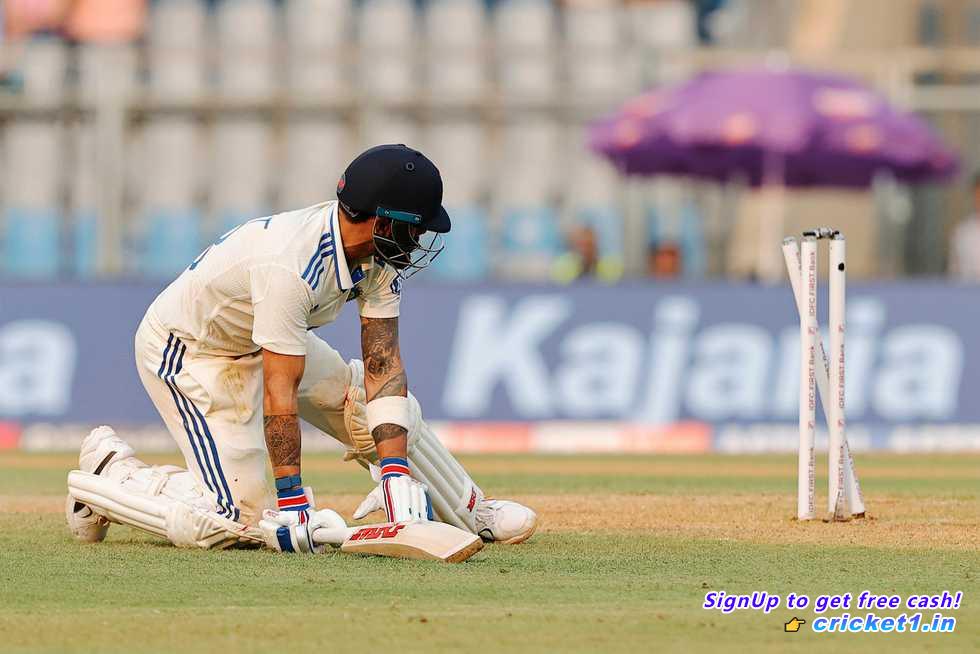
“I was afraid of this.” Ravindra Jadeja’s words encapsulated the unease swirling within the Indian camp as they grappled with a daunting 0-2 deficit in their series against New Zealand. Candid and contemplative, Jadeja reflected on the immense pressure that accompanied playing on home soil. “I had personally thought that as long as I played in India, I didn’t want to lose a single series. But this also happened. So, now I haven’t thought in my mind that I don’t want to do this [or that]. Whatever I think about, it happens suddenly.”
This train of thought likely echoed through the minds of India’s top-order batsmen, who were eager for a shot at redemption when they took to the field in Mumbai. The hosts were eager to reverse their fortunes and appeared to be on track until a late collapse unraveled their hard work in a matter of minutes.
The day commenced on a promising note for India, with Yashasivi Jaiswal and his partner constructing a 53-run stand for the second wicket. Jaiswal, who has been a prolific scorer with over 1000 runs in the past year, found himself unable to replicate that form in this particular series. His highest score had been a mere 77, and this outing saw him dismissed in the thirties for the third time. Attempting a reverse sweep with just 13 minutes left in the day’s play, Jaiswal got out, which triggered a cascade of mistakes that India’s middle order could ill afford.
In the quest to steady the innings under fading light, India’s decision to send Mohammad Siraj as a nightwatchman immediately came under scrutiny. Facing a left-arm spinner on a turning pitch, Siraj was trapped leg-before-wicket on his very first delivery. His decision to review the dismissal consumed one of India’s limited referrals, complicating their situation even further.
With potential collapse on the horizon, Virat Kohli emerged to the crease, tasked with stabilizing the innings. Wearing his pads even before Siraj’s appearance, Kohli faced spin from both ends as New Zealand brought on Rachin Ravindra. Kohli fended off the hat-trick opportunity with solid defense, managing to score his first run by handling a full toss.
Flashbacks to Pune haunted Kohli, where a premature rush for a single had led to Rishabh Pant’s run-out, precipitating a dire collapse of four wickets for 40 runs. Once again, on this pivotal day, Kohli’s eagerness for a quick single proved costly.
. A frantic dive wasn’t enough to save him, and he was dismissed, relegated to a walk back to the pavilion filled with disappointment. Within seven balls, three wickets had fallen, nullifying the earlier diligent efforts aimed at setting right past missteps.
Throughout the afternoon, Jadeja had played a starring role in India’s fightback. Amid stifling humidity, he toiled tirelessly, eventually breaking a determined 87-run partnership for the third wicket. The strenuous conditions taxed not just the players physically but threatened their performance with incessant sweat. Jadeja remarked on the challenges, “It was very challenging. There was a time when I couldn’t even hold the ball. But this is how it is at the international level. You have to prepare for these conditions, and you know that when you come to practice, this was the condition even then. So as a player you know what’s going to happen in the match.”
Jadeja’s breakthrough against Will Young presented India with an opening. They pressed on to bundle New Zealand out for 235, a score they considered manageable given the pre-game speculations after losing the toss. The appeal of seized momentum offered hope yet again, indicating a potential recovery path after a tough start in the series.
Yet, as the day’s play drew to a close, Jadeja found himself defending the top-order’s failures in a press conference. He remarked, “Only an individual player can tell what’s going on in their mind. Obviously it feels like if you’re down 2-0 in the series, that’s why you panicked and you made a mistake. But when you keep winning and when you’re ahead 2-0, then everyone says, ‘It’s okay, it happens’. It doesn’t seem so important.”
These errors, unlike those in Bengaluru or Pune, would test India’s capacity to bounce back, requiring a collective effort. The opportunity for adjustments in the second innings remained, but before reaching that point, India leaned heavily on Jadeja and lower-order batsmen. Their aim was to mitigate the damage and piece together a score that could keep their hopes for redemption afloat.

